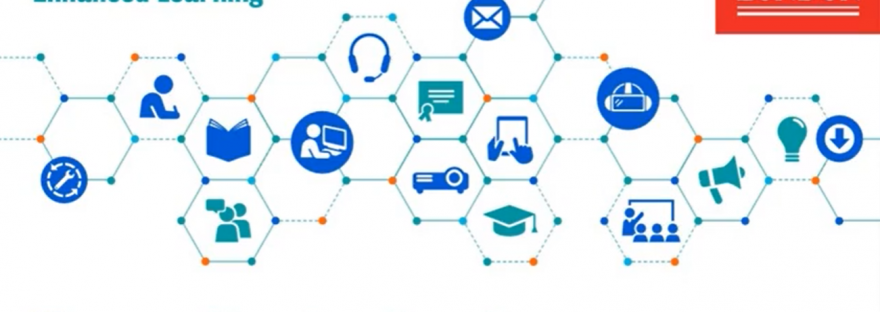In September 2020 King’s College decided to commit to further developing the Captioning and Transcription Service available via the King’s media platform (Kaltura). Academic staff were provided with access to request high quality human transcriptions for their lecture recordings.
Due to rapid engagement between CTEL (Centre for Technology Enhanced Learning) and Education Applications colleagues, this service was successfully launched in Nov 2020 and enabled academic staff to upload video content onto Kaltura to request Human captions within a seven day (although in practice average ranged from 2-4 days) maximum turnaround time for request completion.
The new service would complement the existing Kaltura machine captions available for all other content (non-lecture recordings).
To meet our legal obligations in relation to the web accessibility regulations for public sector bodies, a new captioning project entitled Captioning and Transcription Service was set up.
The main aims of the project were to:
- Enable accurate and timely delivery of captions/transcripts for lecture content published to students, including pre-recorded and live lectures available on-demand.
- Meet accessibility legislation stipulating ‘time-based media’ (pre-recorded digital content) be made available with captions/transcripts.
- Go beyond the minimum automated captioning approach to deliver accurate and quality supplementary material to ensure all students can access their teaching at the point of delivery.
It was decided that our existing media streaming platform Kaltura would be the tool utilised to offer both professional and automatic machine captioning.
From 30th November 2020 academic staff were able to request professional captions for all lectures (both synchronous and asynchronous) whilst all other media content uploaded to Kaltura would be automatically machine captioned.
Through Kaltura a new captioning option was made available to Academics, the ‘Human Caption Service’ which would be available within the Kaltura interface within KEATS (Moodle VLE (Virtual Learning Environment)) and directly through the King’s Kaltura MediaSpace (KMS):
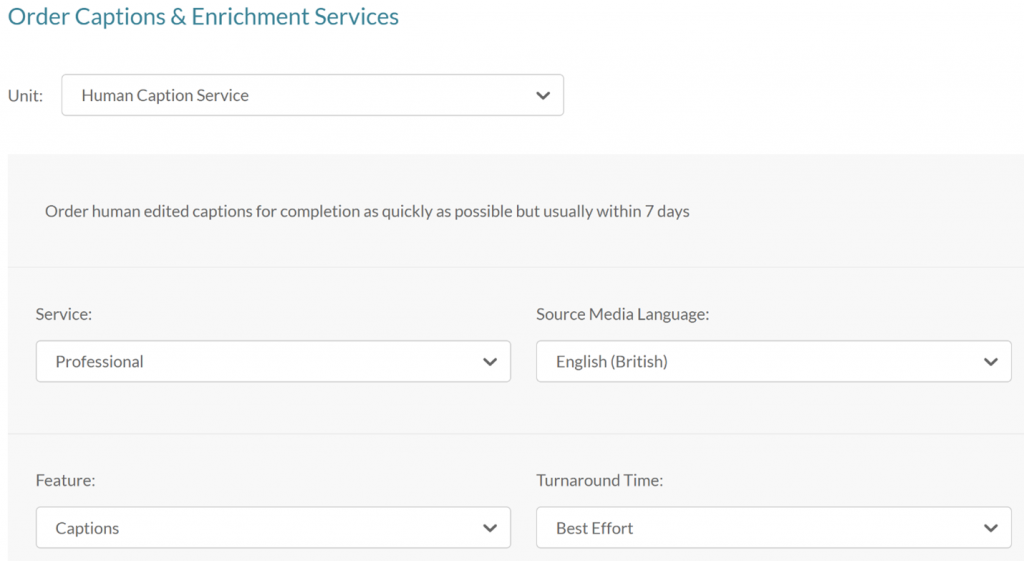
Prior to the new service being rolled out, all content uploaded to Kaltura only had machine automated captions available. As this was machine captioned accuracy ranged between 70-90% depending on several variables such as subject matter, style of delivery, accents, audio device utilised etc. Since the introduction of the human captions, we have seen accuracy increase to approx. 95-97% and quality captioned content has been seen to have significant importance for students.
In terms of turnaround for professional captions, the service level agreement with Kaltura is 7 days from request, although in practice it was usually completed within 4 days.
Regular updates of project were communicated in several ways to reach as many colleagues as possible, which included working groups, central TEL (Technology Enhanced Learning) meetings, Kaltura Super User meeting, faculty TEL meetings, faculty liaison meetings, monthly update (email).
All Kaltura staff guidance was updated with details and information of the new service including a step-by-step guide on how to order and edit captions:

The guidance also included video tutorial walkthroughs to complement the written information: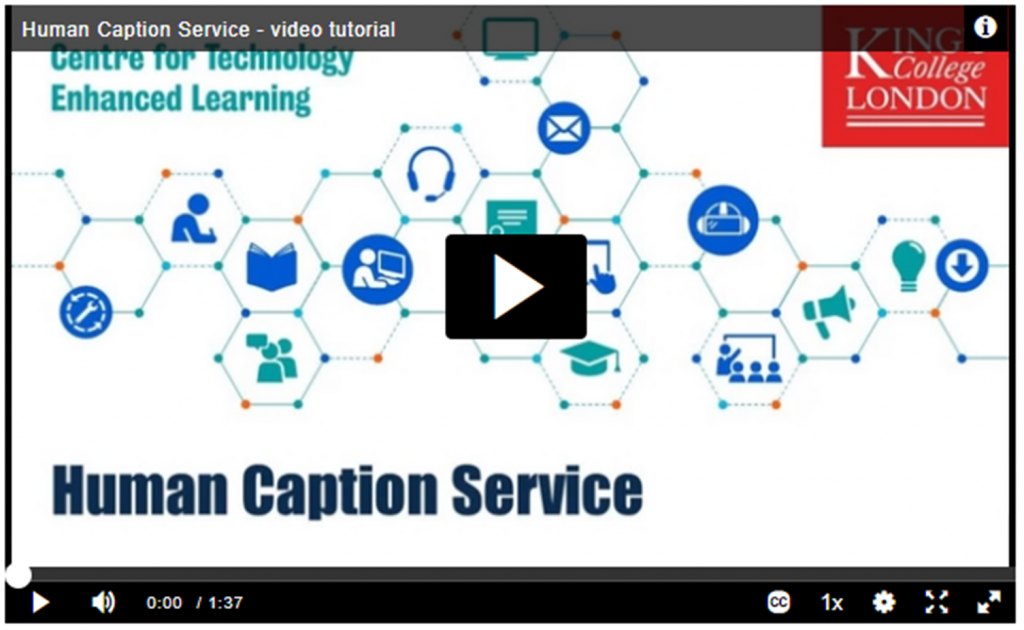
In addition, the existing Kaltura beginner online workshop was amended to include information about the new service and how to order and edit captions.
The Kaltura student guidance was also updated to include relevant information about the new changes including the ability to download captions and transcriptions:
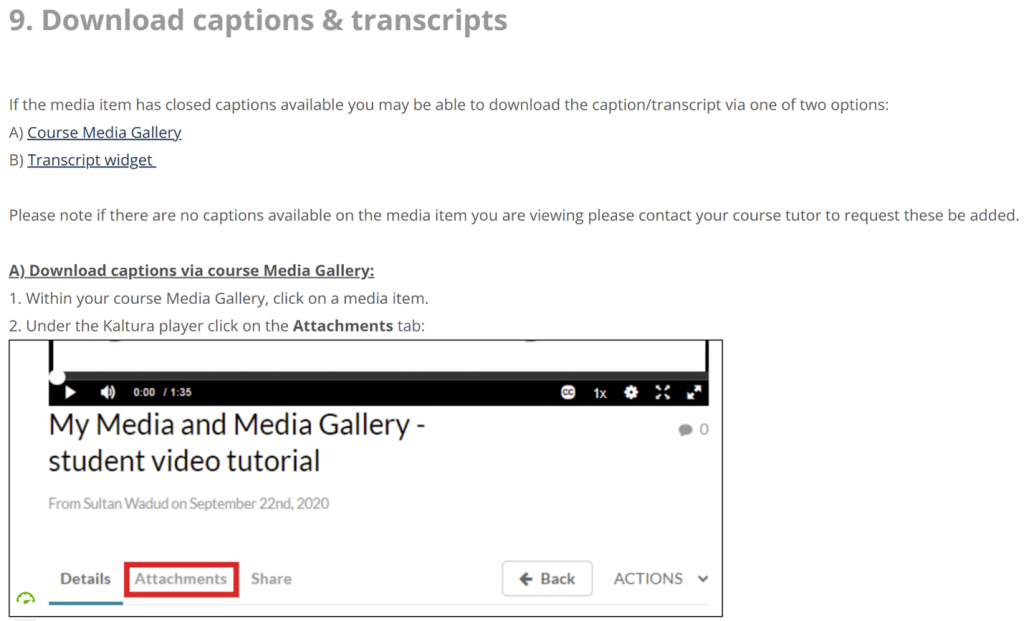
Since the launch of the service to academic staff in King’s faculties, there was some interest from professional service teams who are focused on delivering educational content for students. Following a review, they can now also order professional captions.
Since the successful introduction of the service in September 2020 we have had a total of 101,200 automatic machine captions and a total of 14,300 professional human caption requests. This equates to approx. 150,000 minutes (2500 hours) of video content having been human transcribed across King’s, with the Faculty of Life Sciences & Medicine (FoLSM) representing 27% of all requests and King’s Business School (KBS) representing 26% of all requests being the biggest users of the professional captioning service.
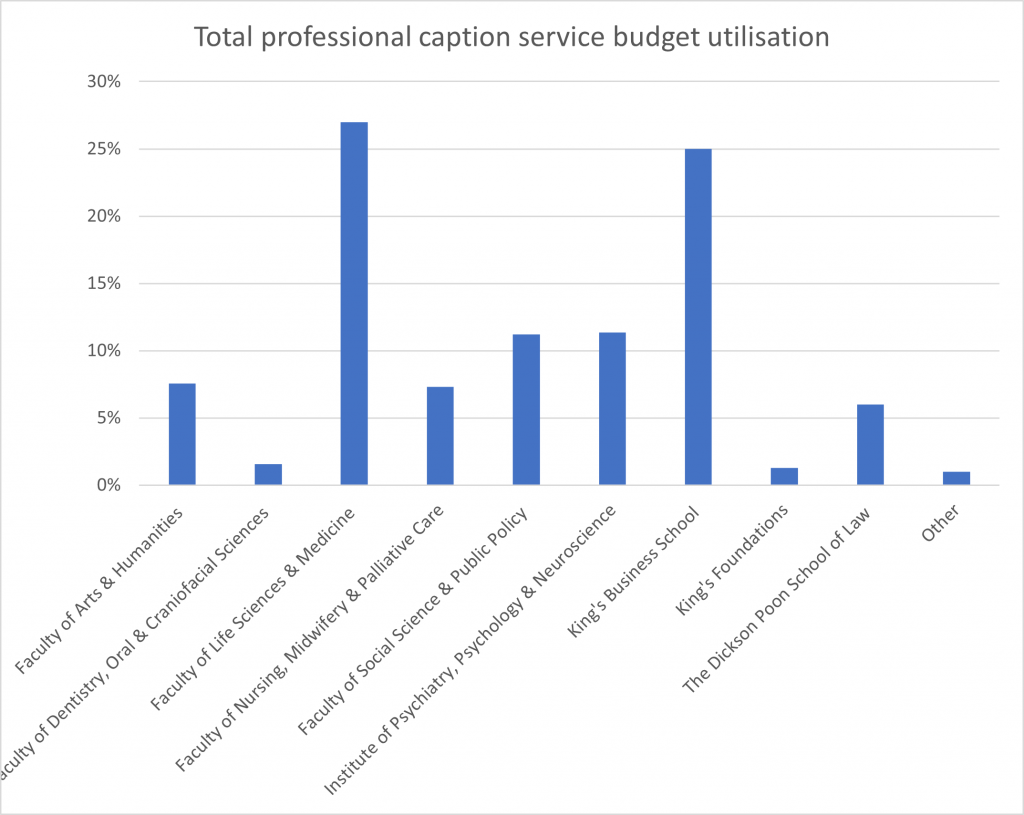
During 2021 we also saw greater engagement from professional departments who had not previously utilised Kaltura becoming more aware, attending the training and familiarizing themselves with Kaltura including captioning tools available to them.
Overall, the new captioning service has been well received, offering increased accuracy for captions as well as eliminating the need for academics to manually edit machine captions for lecture recordings, thus saving time.
CTEL and the Education Apps team are currently exploring professional (human) translation services offered by Kaltura to enhance the existing captioning and transcription service further. This service would follow a similar workflow as the human captioning service and would only be available for lectures.
Further resources (accessible for King’s staff only):
King’s has a range of resources to ensure your teaching materials are as accessible as possible:
- Find out more about the Digital Education Accessibility Baseline
- Blackboard Ally Course Accessibility Report can help you focus on your content with the biggest accessibility issues and content that is easiest to fix.
- Request and edit captions (human and machine) Kaltura guidance
- More about King’s Online Accessibility Resources
Written by Sultan Wadud
Sultan Wadud works as a Learning Technologist, Faculty Liaison at CTEL, working closely with Academic Faculties and Departments to support and drive the implementation of the King’s Technology Enhanced Learning ‘Transformation in Digital Learning’ strategy.
Wadud supports the management and delivery of multiple projects aimed at both the development of academics’ pedagogic understanding and the practice of technology enhanced learning.
Wadud has a keen interest in exploring new ways to utilise existing or new technology to enhance teaching and learning.
